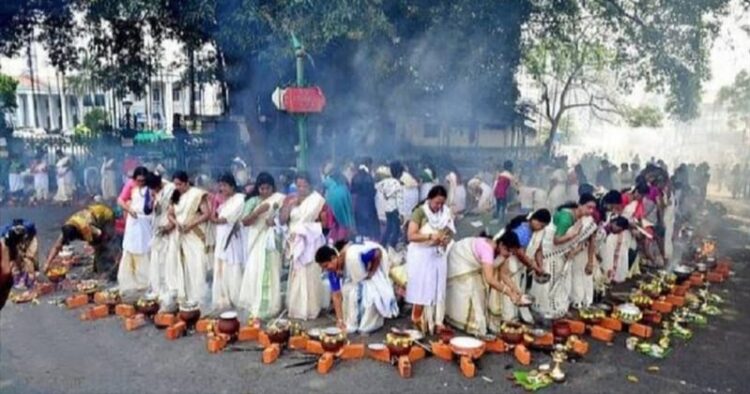Lakhs of women from all over the State and even other States and also abroad offered Pongala on February 25, around 10 km, around the famous and ancient Attukal Bhagavathi Mandir, Thiruvananthapuram city.
Women devotees cooked ‘Pongala payasam’ for the deity of Bhagavathi, in brick hearths lined up on either side of the roads in the city roads. ‘Pongala’ is a mix of rice, jaggery, scraped coconut, powdered cardamom, fried cashew nuts and raisins. Pongala festival marks the finale of the ten-day ritualistic Mandir festival of Attukal Bhagavathi.
Most of the people had ‘booked’ the space by arranging the hearths of bricks the previous day. Several people reached the city the previous day; some of them stayed in hotels, and some others opted to stay with their friends or relatives. Despite all odds, they remained determined to partake in the Pongala ritual, driven by a noble purpose: ‘Participate in the Pongala ritual’. They braved the scorching heat for the accomplishment of their bhakti and shraddha towards ‘Amma’. Men are not permitted in the Mandir premises during the ‘Pongala ritual’. Because it is the ‘Women’s Sabarimala’. Here, women of all age groups are coming to ‘enjoy’ the heat of the hearth from the floor and the blazing sun from the skies. It is to be remembered that women between the ages of 10 and 50 are not permitted in Sabarimala, hence generally considered the ‘men’s Mandir’. Moreover, one has to scale several hills and walk on foot through forests to reach Sabarimala shrine. But, in Attukal, there is no age bar for women. Every year, the number of women flocking to Thiruvananthapuram for ‘Pongala’ increases in geometric progression. That is why this world-famous festival got a comfortable place in Guinness World Records. It was said that in 2009, the total number of women who attended the ‘Pongala’ ritual was 2.5 million. It described the festival as the ‘largest religious gathering of women on a single day’.
The ritual started when the chief pujari Goshala Vishnu Vasudevan Namboothiri lit the Mandir hearth at 10.30 am. When the chief pujari offered the ‘nivedyam’ before Attukal Bhagavati at 2.30 pm, it was the culmination. Around 300 sub-pujaris were assigned to complete the ritual. They went to all the streets and poured the holy water, brought from the Mandir, into the pots boiling in the hearths. Thus, the payasam cooked turns ‘nivedyam’. The entire devotees chanted prayers, seeking Devi’s blessings. At the same time, a helicopter performed flower showers around the Mandir.
Kerala State Road Transport Corporation (KSRTC) organised 500 special buses, and Southern Railway deployed special memu trains exclusively for women. The capital city carried a festive look. Those who couldn’t go to Thiruvananthapuram for ‘Pongala’ were contented with performing it at their homes throughout the State.




















Comments